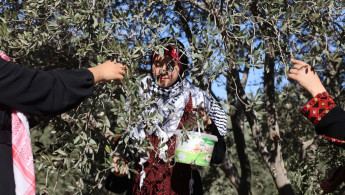Gaza olive harvest 'down 60 percent' amid effects of climate change, ministry says
Gaza's Agriculture Ministry said on Wednesday that climate change has caused a dramatic drop in the number of olives harvested in the besieged Gaza Strip.
Ministry spokesman Adham al-Basiouny told The New Arab that there had been a 60 percent decline in olive production in 2021 due to adverse environmental conditions.
Much of the Middle East experienced exceptionally hot, dry weather last winter.
"It is the first time in 30 years that the Gaza Strip has witnessed such a drop in olive product," al-Basiouny said.
"I expect that there will be more declines in the olive product in the coming years, due to climate change in Palestine."
Less than a third of the roughly 40,000 dunams planted with olive trees in the Gaza Strip actually produced olives, he added.
|
Gaza farmers say they have suffered great losses this olive harvest season because their trees did not bear enough fruit.
Farmers told The New Arab that they could not raise the prices of the olives they harvested because impoverished locals would not be able to afford them.
Mohammed Abu Muhady, a farmer with 150-dunams of land planted with olive trees to the east of Gaza City, told The New Arab that he has harvested less than 60 tonnes of olives this year.
He said he used to harvest at least 150 tonnes of olives each year.
“Because of the significant decline in my production, I was forced to decrease the number of my workers, who wait for the season every year to make money to keep their families afloat,” the 52-year-old said.
Ibrahim al-Shaer, a farmer from the city of Rafah in the southern Gaza Strip, said he fears that he will not be able to sell his olives in such unprecedented conditions.
Both farmers called on local authorities not to import olive products from abroad, which are sold for less than those produced domestically and could cause further financial losses for Gaza's farmers.
However, Basiouny said his ministry has already allowed Gazan merchants to import olive products from abroad, as the local product covers only 35 percent of Gaza's needs.





 Follow the Middle East's top stories in English at The New Arab on Google News
Follow the Middle East's top stories in English at The New Arab on Google News


